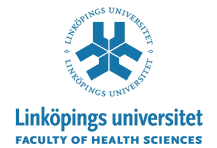 |
Visa svensk kursplan |
|
COURSE CATEGORY Single subject course MAIN FIELD OF STUDY Medical Biology SUBJECT AREA Medical Biology |
COURSE CODE | 8FA225 |
LEARNING OUTCOMES
By the end of the course the students will be able to:
Knowledge and understanding
- Understand the mechanisms of action of different drugs on a molecular, cellular and physiological level
- Analyze drug effects on a molecular to medical level
- Analyze advanced models of drug/receptor protein interactions
Competence and skills
- Apply an advanced knowledge in pharmacological sciences in order to design and perform laboratory studies and to critically interpret obtained results
Judgement and approach
- Evaluate and analyze complex pharmacological questions presented in the scientific literatu
- Mechanisms and medical effects of drugs that interact with G-protein coupled receptors
- Drugs that interact with transmembrane proteins
- Drugs that interfere with intracellular target proteins
- Drugs that affect the neuron and neurotransmission
- Pharmacokinetics
- Recent research within some field of pharmacology; pharmacodynamics and pharmacokinetics
Specific: In this course lectures, tutorial groups, seminars and laboratory work are used
Active participation in the compulsory parts is necessary to pass the course, and assessment of them is carried out continuously. Compulsory parts in this course are: tutorial groups, group assignments- including laboratory work and in-depth studies, and seminars.
EXAMINATION
Individual written examination.
SCOPE OF RE-EXAMINATION
The extent of a re−examination shall be similar to the regular examination.
CHANGE OF EXAMINERS
Students who have failed the course or part of the course twice are entitled to request another examiner for the following examination occasion, unless specific reasons are present.
REGISTRATION FOR EXAMINATION
The procedure for registration should be stated prior to the commencement of each course. In other respects, regulations concerning examination and examiners are applied in accordance with Linköping University policy.
Applicants must also have documented knowledge of English equivalent to Engelska B/Engelska 6; i.e. an internationally recognized test, e.g. TOEFL (minimum scores: Paper based 575 + TWE-score 4.5, and internet-based: Score of 20 (scale 0-30) in written test, total score of 90), IELTS, academic (minimum score: Overall mark of 6.5 and no section below 5.5), or equivalent.
The course is carried out in such a way that both men’s and women’s experience and knowledge is made visible and developed.
If the course is withdrawn, or is subject to major changes, examinations according to this course plan are normally offered on a total of three occasions within one year, one of them in close connection to the first examination.
|
||||||||||||||||||||||||||||||||||||||||||||||||||||||||||||||||||||||||||||||